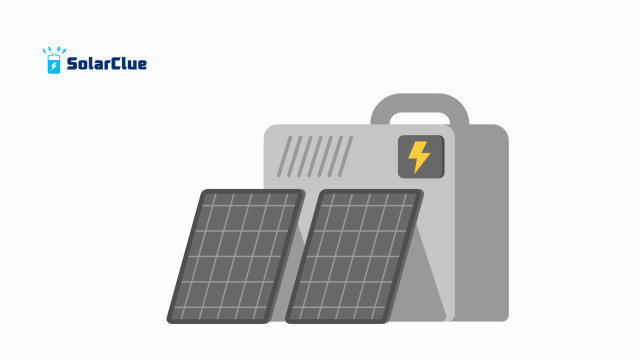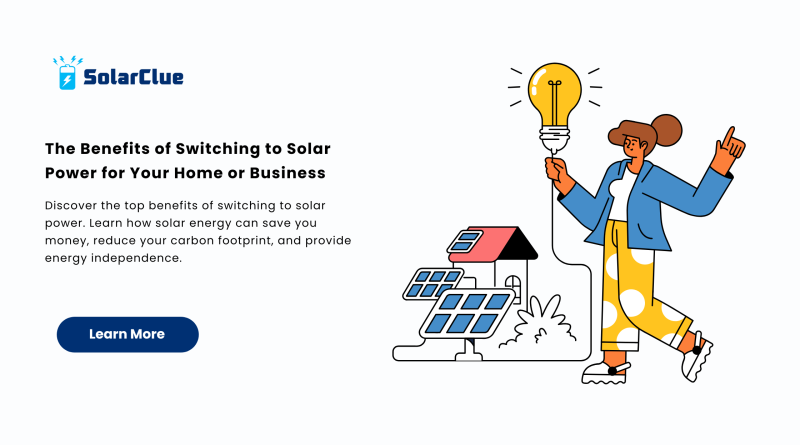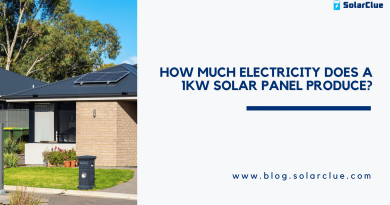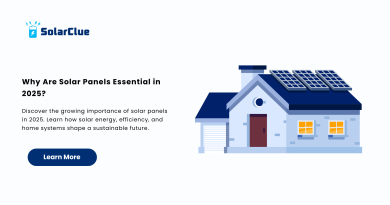The Benefits of Switching to Solar Power for Your Home or Business
Switching to solar power is one of the most impactful decisions you can make for your home or business. With the world focusing on sustainability and reducing carbon footprints, solar energy presents a solution that not only benefits the environment but also your wallet. This blog explores the benefits of switching to solar power, and how adopting a solar power system can change the way you consume energy.
Table of Contents
- 1 Why Solar Power is the Future of Energy
- 1.1 1. Cost Savings on Energy Bills
- 1.2 2. Energy Independence
- 1.3 3. Environmental Benefits
- 1.4 4. Increased Home Value
- 1.5 5. Low Maintenance and Long Lifespan
- 1.6 6. Job Creation and Economic Growth
- 1.7 7. Solar Power System Versatility
- 1.8 8. Reduced Carbon Footprint and Support for Global Sustainability
- 2 FAQs About Switching to Solar Power
- 3 Conclusion
Why Solar Power is the Future of Energy
As the world moves towards cleaner and more sustainable energy sources, solar power has emerged as a key player in transforming the energy landscape. Solar panels harness the power of the sun and convert it into solar energy that can power homes, businesses, and even entire cities. Here are some reasons why switching to solar power is a smart move:
1. Cost Savings on Energy Bills
One of the most immediate benefits of switching to a solar power system is the potential to save money on your energy bills. By generating your own electricity from the sun, you can reduce or even eliminate your reliance on the grid. Over time, the savings can add up significantly, especially with the increasing cost of electricity from conventional sources.
In addition, many governments offer incentives, rebates, and tax credits to help reduce the upfront costs of installing solar panels. This makes it an even more attractive investment for homeowners and businesses alike.
2. Energy Independence
With a solar power system, you are no longer at the mercy of utility companies and fluctuating energy prices. Solar panels generate energy during the day, and if paired with battery storage, you can store that energy for use during the night or cloudy days. This means you can reduce your dependence on the grid, giving you greater control over your energy consumption.
Furthermore, solar energy is renewable and will not run out as long as the sun shines, making it a reliable long-term solution for energy independence.
3. Environmental Benefits
Switching to solar energy helps reduce your carbon footprint, contributing to a cleaner and healthier environment. Traditional power generation methods, such as coal and natural gas, release harmful greenhouse gases that contribute to global warming and air pollution. Solar panels, on the other hand, produce clean, renewable energy that does not generate harmful emissions.
By adopting solar energy, you are making a positive impact on the environment, and helping to combat climate change. This is a key reason why many governments and environmental organizations are pushing for greater adoption of solar power.
4. Increased Home Value
Homes with solar panels are becoming more desirable on the market. Studies have shown that properties with solar power systems sell faster and at higher prices than those without. Buyers are increasingly looking for homes with energy-efficient features, and solar panels are at the top of the list.
This makes installing a solar power system not only a financially smart move but also a valuable investment that can increase the resale value of your property.

5. Low Maintenance and Long Lifespan
Once installed, solar panels require very little maintenance. They have no moving parts, making them durable and reliable. Regular cleaning and occasional inspections are all that is typically required to keep them functioning optimally.
Moreover, solar panels have a long lifespan, with most systems lasting 25 to 30 years. This means you can enjoy decades of free energy, making it a worthwhile investment in the long run.
6. Job Creation and Economic Growth
The solar power industry is growing rapidly and has created thousands of jobs worldwide. By switching to solar, you are supporting the growth of this green industry, which offers employment opportunities in installation, maintenance, manufacturing, and research. This contributes to the local economy and promotes sustainable development.
7. Solar Power System Versatility
Solar power systems are highly versatile and can be used for a wide range of applications. From residential homes and commercial buildings to agricultural operations and remote areas, solar energy can provide a reliable and cost-effective power source.
Whether you need to power a single home or a large industrial operation, there is a solar power system solution that fits your needs.
8. Reduced Carbon Footprint and Support for Global Sustainability
Switching to solar energy is one of the most effective ways to reduce your personal or business carbon footprint. By generating electricity from the sun, you are significantly reducing your reliance on fossil fuels, which are the primary source of greenhouse gas emissions.
As more individuals and businesses make the switch to solar power, the collective impact can help slow down the effects of climate change and work toward a more sustainable future.
FAQs About Switching to Solar Power
Q1: How much do solar panels cost to install?
The cost of installing solar panels depends on factors such as the size of the system, the quality of the panels, and installation fees. However, government incentives, tax credits, and rebates can help reduce the upfront costs.
Q2: How long do solar panels last?
Solar panels typically last between 25 to 30 years with minimal maintenance. Most panels come with a warranty that guarantees performance for at least 25 years.
Q3: Will solar panels work on cloudy days?
Yes, solar panels can still generate electricity on cloudy days, although their efficiency may be slightly reduced. Solar panels generate energy from sunlight, not just direct sunlight, so they can still produce energy even in overcast conditions.
Q4: Can solar panels increase my home’s value?
Yes, homes with solar power systems are often more attractive to buyers, which can lead to a higher resale value. Studies have shown that homes with solar panels tend to sell faster and at a premium price.
Q5: What is net metering?
Net metering allows homeowners with solar panels to send excess energy back to the grid and receive credits for the electricity they contribute. This helps offset the cost of electricity when your solar system isn’t producing enough power, such as at night.
Conclusion
Switching to solar power provides a multitude of benefits, from reducing energy bills to contributing to a cleaner environment. As the world moves towards more sustainable energy sources, adopting a solar power system is not just a smart investment—it’s a responsibility to future generations. Take the first step towards energy independence and environmental sustainability by making the switch to solar energy today.
Ready to make the change? Visit our website at SolarClue and learn more about how we can help you get started on your solar journey! For more insights and tips on solar energy, visit blog.solarclue.com.




